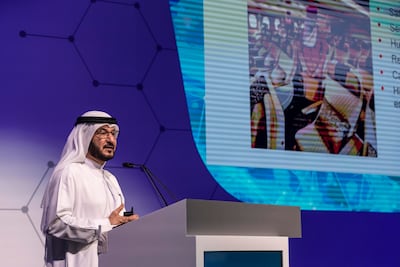From slashing time spent on hold with call centres and improving training for cabin crew to finding the most efficient flight routes, generative artificial intelligence is expected to have a big impact on the airline industry.
At the Dubai Assembly for Generative AI, industry experts said airlines were approaching a step change in the way they operated due to the acceleration of automated technology.
While traditional AI can perform specific tasks and functions centred on predefined rules and patterns, generative AI learns the structures of data to generate new data with similar characteristics.
The technology is being used to improve the way several industries operate.
Customer care meets efficiency
After years of cutbacks enforced by the pandemic, airlines that made the most savings are now facing a critical battle for survival, while those that invested in staff and customer experience are enjoying a boom in business, the panellists said.
Speaking at the event was chief operations officer at Emirates Airline, Adel Al Redha, who said that AI could take the passenger experience "to the next level".

“By using AI, we can give the customer the experience they deserve while at the same time, provide companies the efficiency they've been asking for and looking for,” he said.
“At Emirates, we have taken a step change in training our cabin crew from traditional trainers to using generative AI that is delivering a very complicated training programme.
“Many companies have gone towards cost reductions and savings.
“Maybe they have survived for a short term, but they're dying now because they have cut down on the level of product innovation, investment and customer experience in what they can offer.
“Now we need to take the customer experiences to a different level.”
AI improving customer service
From using AI to plan the most efficient routes for aircraft, to using generative AI to help customers book flights, check-in at airports or make changes to their itineraries, the technology has huge potential to streamline the industry.
Improving technology has already resulted in more people booking flights direct with Emirates online, with that trend likely to continue as automated technology continues to advance.
Mr Al Redha said Emirates had to be ready to adapt to the changing technological needs of its customers.
“Five years ago, maybe we were dreaming to get 5 per cent or 10 per cent of our online bookings done directly by customers,” he said.
“We have had to deal with the technology, investment and the wider availability of devices.
“Now, we’re seeing more than 50 per cent of our customers do their business directly with us.
“Not too far in the future, we will see maybe close to 80 per cent of our customers wanting to do that."
Airlines are already using AI tools to manage aircraft use, helping reduce the standing time at airports and cutting emissions.
Similar technology can also be used to improve productivity of airline staff, panellists said.
“When we look at generative AI, we see two big opportunities for aviation companies,” said Tom Isherwood, a partner in digital and analytics at Quantum Black AI by McKinsey.
“First is in significantly improving the customer experience, and second is significantly increasing the productivity of employees.
“When we look at what you can do with customer experience, the sky is the limit.
“You can reimagine entirely the booking experience so that you can give suggestions or ideas.
“You can actually answer questions on the spot about the itinerary that maybe people would otherwise have to call up a call centre to understand.
“That could be a much better experience that could also lead to revenue growth.”
Despite the potential improvements, concerns remain over how customer data will be secured when using AI programmes.
“I think privacy and security is a big concern when it comes to the adoption of generative AI technologies in general,” said Aysar Yousef, data and AI lead at Microsoft UAE.
“The challenge is from the fact you are handing over a piece of data to a model to process, and then generate content.
“Security is a common concern we hear from multiple industries, including aviation.”


